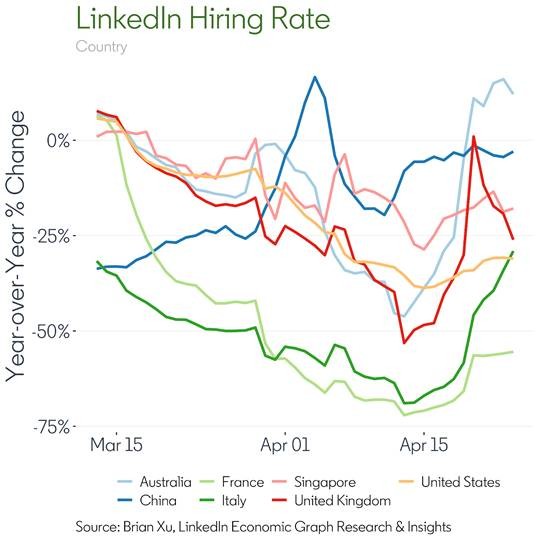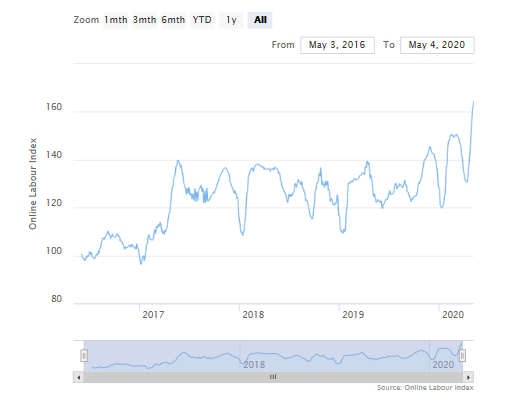#1. Rapid hiring declines begin to slow
As coronavirus continues to disrupt our economies, many parts of the world have experienced a sharp decline in hiring. However, according to LinkedIn there is a reason for optimism as many of these declines have now started to slow. For instance, in China, we have seen a quick rebound in the past weeks, and hiring in the United States and Singapore is also showing signs of recovery. This market volatility has, however, impacted workforce confidence. The Workforce Confidence Index shows that while industries such as Transportation & Logistics feel more upbeat about the future and HR professionals are the most confident about their career progression, Education and Corporate Services have lowered their expectations and sectors such as Entertainment and Media remain most concerned.

#2. More big employers are talking about making work-from-home permanent
While many workers around the world are yet to return to their offices, some of the big companies, including Mondelez, Nationwide and Barclays are already talking about making work-from-home permanent. Reducing their real estate footprint would not only cut their costs but also help make flexible work the new norm in the post-COVID world. CEO Dirk Van De Put of food giant Mondelez said last week that the company might no longer need all its office space. And according to Barclays CEO Jes Staley crowded corporate offices with thousands of employees “may be a thing of the past.” But offices should not be discarded right away as they allow employees to socialise. Furthermore, coming out of a weeks- if not months-long lockdown, many employees will be eager to return to their respective office desks more than is given credit for and this should be reflected by the companies’ policies.

#3. 13 ways the coronavirus pandemic could forever change the way we work
Other than making remote work more permanent, what further changes to the way we work will we see in the coming months? CNBC has asked experts in the field, including General Assembly’s CEO Jake Schwartz to identify the trends they believe will have a lasting impact. Among others, the article highlights that in the post-pandemic world workers might be less inclined to attend meetings and instead use emails and instant messaging. Companies putting an emphasis on remote work will likely provide their employees with a stipend to help cover the cost of the necessary equipment while working virtually will also lead to the end of business travel as we know it. With health and safety becoming more prominent than before, many of us might need to get used to mandatory medical screenings at work while we’ll also see automation come to the fore in the workplace.

#4. More professionals upskill at home
As reported previously, many people have decided to use the current crisis to develop their skills. According to the latest data from LinkedIn, online learning proves to be popular both among younger workers as well as the top management. Between February and March, the company observed a 63% spike in C-level professionals viewing courses on LinkedIn Learning, with the most popular subjects being ‘working remotely’, followed by ‘time management’ and ‘working from home’. Among Gen Z professionals, interest for online learning grew by 26% and in particular for soft skills courses such as ‘leading from a distance’. Given these uncertain economic times, it is expected that upskilling will continue gaining in prominence as workers will seek ways to become more competitive and adaptable.

#5. A surge in remote freelancing jobs
And last but not least, the Online Labour Index has reached an all-time high this week, meaning more remote freelancing jobs are posted on online labour platforms than ever before. On average, the number of jobs posted per day has jumped by 30% compared to the same time last year. With now 47% of US graduates entering the labour market as freelancers, it is expected that this type of work will become more dominant in the future and that online platforms will play an increasingly important role in facilitating this trend. However, as has become obvious during the COVID-19 crisis, it is important to upgrade our social contract to ensure all forms of work, including freelancers, have access to social protection.




